Business Plan: Social Venture for Solar Home Systems in Africa
VerifiedAdded on 2022/12/23
|12
|3255
|1
Report
AI Summary
This business plan outlines a social venture idea for installing solar home systems in Africa, specifically targeting low-income earners in rural and remote areas. The plan addresses the problem of electricity unavailability, proposing a solution that involves providing affordable solar home systems, such as solar lamps and mobile charging stations, to replace traditional kerosene lamps. The business model focuses on identifying the target market, which includes individuals without access to the power grid, environmentally conscious consumers, and those seeking cost-effective energy alternatives. The plan details a theory of change, outlining the resources, activities, and outputs required to achieve its goals. It also includes a financial analysis, assessing the viability of the venture and its potential impact on the target communities. The primary focus is on utilizing Africa's abundant solar resources to foster economic growth and improve living standards through sustainable energy solutions. The report also mentions the importance of involving microfinance institutions to provide loans to low-income consumers.
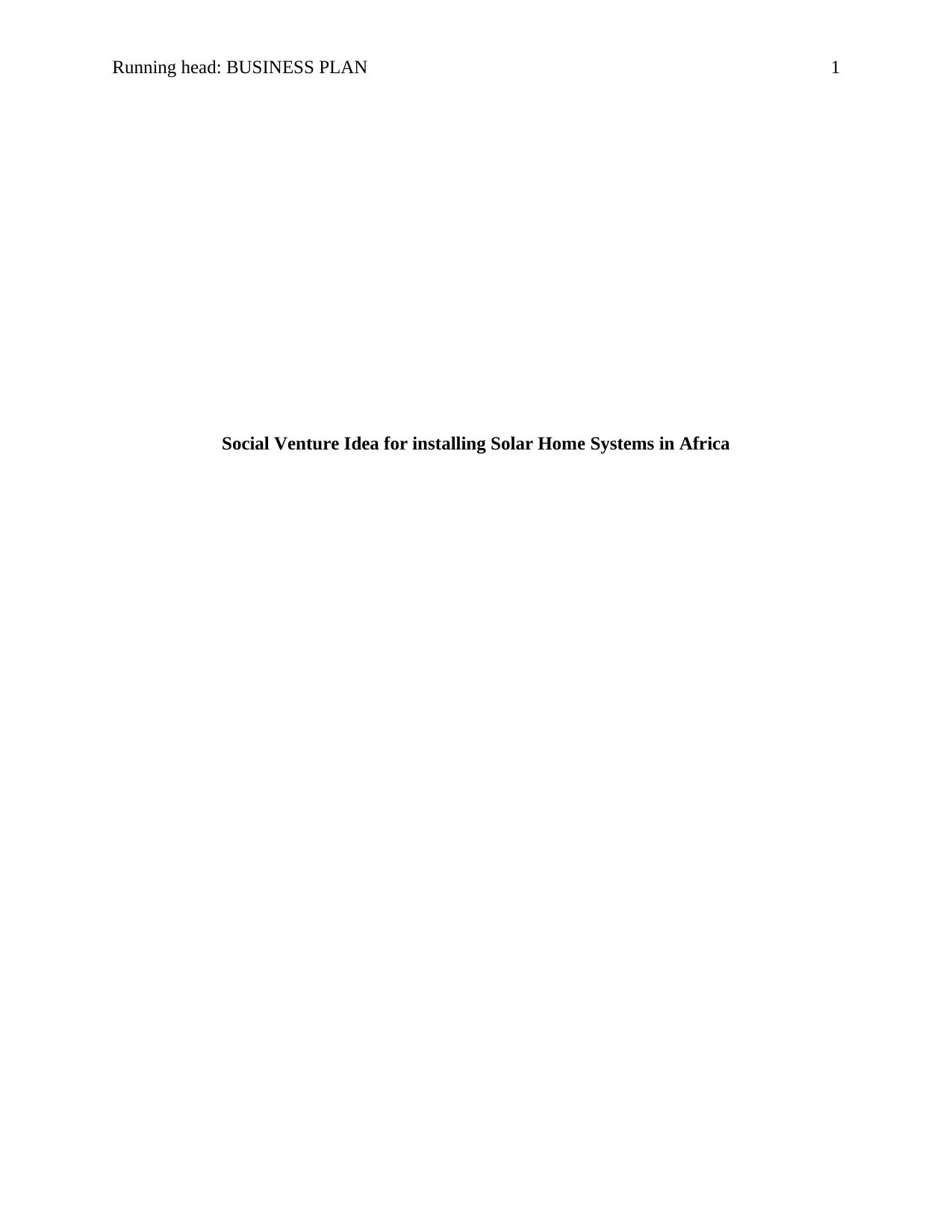
Running head: BUSINESS PLAN 1
Social Venture Idea for installing Solar Home Systems in Africa
Social Venture Idea for installing Solar Home Systems in Africa
Paraphrase This Document
Need a fresh take? Get an instant paraphrase of this document with our AI Paraphraser
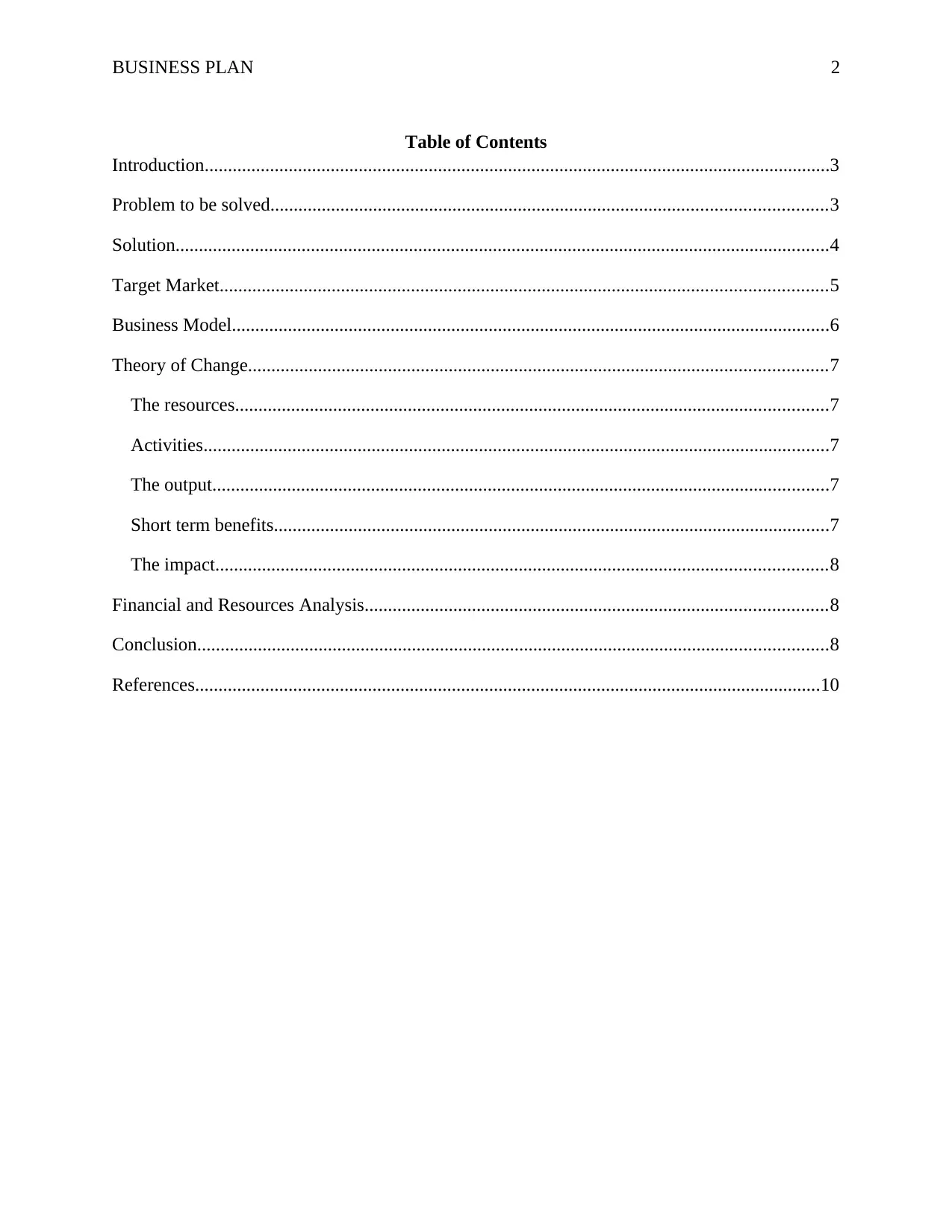
BUSINESS PLAN 2
Table of Contents
Introduction......................................................................................................................................3
Problem to be solved.......................................................................................................................3
Solution............................................................................................................................................4
Target Market..................................................................................................................................5
Business Model................................................................................................................................6
Theory of Change............................................................................................................................7
The resources...............................................................................................................................7
Activities......................................................................................................................................7
The output....................................................................................................................................7
Short term benefits.......................................................................................................................7
The impact...................................................................................................................................8
Financial and Resources Analysis...................................................................................................8
Conclusion.......................................................................................................................................8
References......................................................................................................................................10
Table of Contents
Introduction......................................................................................................................................3
Problem to be solved.......................................................................................................................3
Solution............................................................................................................................................4
Target Market..................................................................................................................................5
Business Model................................................................................................................................6
Theory of Change............................................................................................................................7
The resources...............................................................................................................................7
Activities......................................................................................................................................7
The output....................................................................................................................................7
Short term benefits.......................................................................................................................7
The impact...................................................................................................................................8
Financial and Resources Analysis...................................................................................................8
Conclusion.......................................................................................................................................8
References......................................................................................................................................10
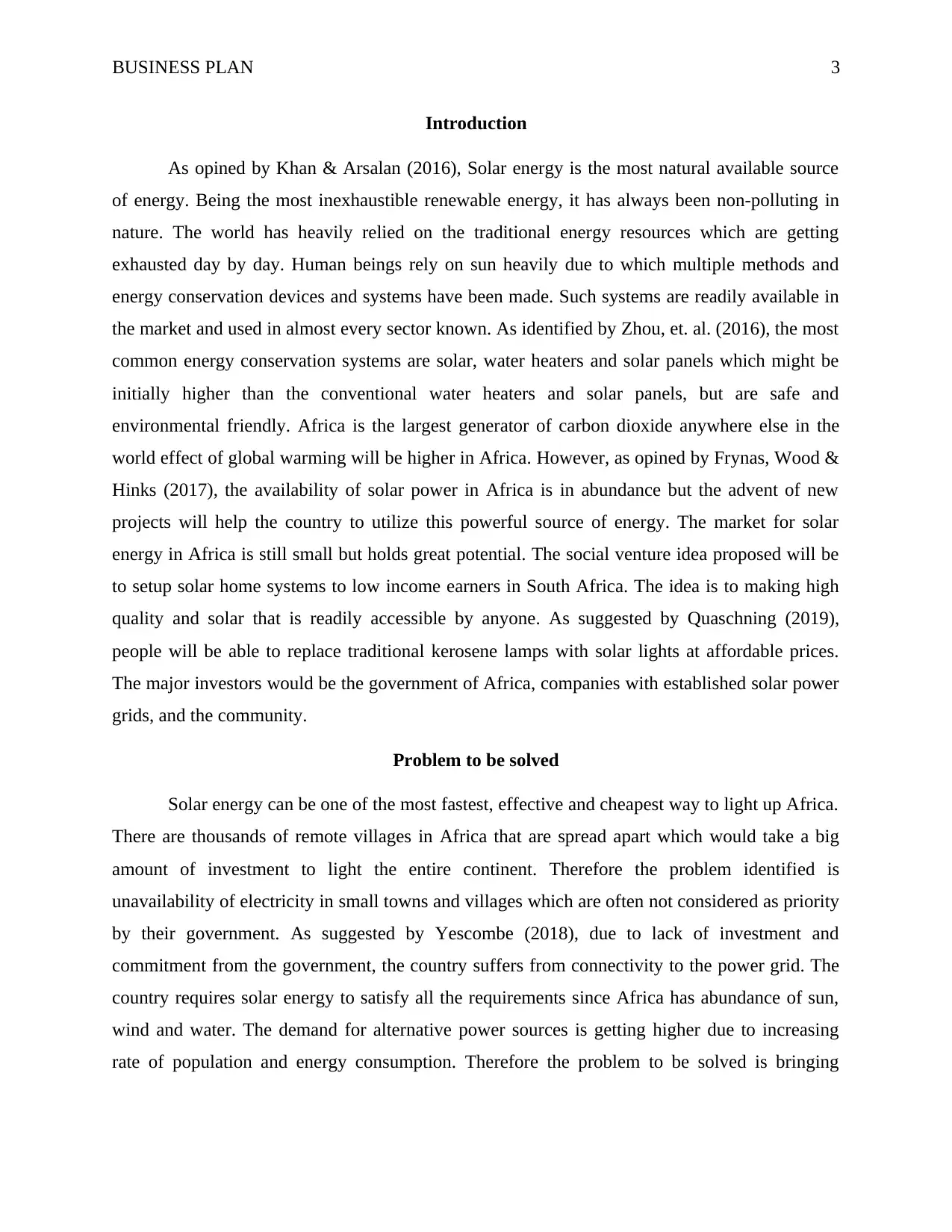
BUSINESS PLAN 3
Introduction
As opined by Khan & Arsalan (2016), Solar energy is the most natural available source
of energy. Being the most inexhaustible renewable energy, it has always been non-polluting in
nature. The world has heavily relied on the traditional energy resources which are getting
exhausted day by day. Human beings rely on sun heavily due to which multiple methods and
energy conservation devices and systems have been made. Such systems are readily available in
the market and used in almost every sector known. As identified by Zhou, et. al. (2016), the most
common energy conservation systems are solar, water heaters and solar panels which might be
initially higher than the conventional water heaters and solar panels, but are safe and
environmental friendly. Africa is the largest generator of carbon dioxide anywhere else in the
world effect of global warming will be higher in Africa. However, as opined by Frynas, Wood &
Hinks (2017), the availability of solar power in Africa is in abundance but the advent of new
projects will help the country to utilize this powerful source of energy. The market for solar
energy in Africa is still small but holds great potential. The social venture idea proposed will be
to setup solar home systems to low income earners in South Africa. The idea is to making high
quality and solar that is readily accessible by anyone. As suggested by Quaschning (2019),
people will be able to replace traditional kerosene lamps with solar lights at affordable prices.
The major investors would be the government of Africa, companies with established solar power
grids, and the community.
Problem to be solved
Solar energy can be one of the most fastest, effective and cheapest way to light up Africa.
There are thousands of remote villages in Africa that are spread apart which would take a big
amount of investment to light the entire continent. Therefore the problem identified is
unavailability of electricity in small towns and villages which are often not considered as priority
by their government. As suggested by Yescombe (2018), due to lack of investment and
commitment from the government, the country suffers from connectivity to the power grid. The
country requires solar energy to satisfy all the requirements since Africa has abundance of sun,
wind and water. The demand for alternative power sources is getting higher due to increasing
rate of population and energy consumption. Therefore the problem to be solved is bringing
Introduction
As opined by Khan & Arsalan (2016), Solar energy is the most natural available source
of energy. Being the most inexhaustible renewable energy, it has always been non-polluting in
nature. The world has heavily relied on the traditional energy resources which are getting
exhausted day by day. Human beings rely on sun heavily due to which multiple methods and
energy conservation devices and systems have been made. Such systems are readily available in
the market and used in almost every sector known. As identified by Zhou, et. al. (2016), the most
common energy conservation systems are solar, water heaters and solar panels which might be
initially higher than the conventional water heaters and solar panels, but are safe and
environmental friendly. Africa is the largest generator of carbon dioxide anywhere else in the
world effect of global warming will be higher in Africa. However, as opined by Frynas, Wood &
Hinks (2017), the availability of solar power in Africa is in abundance but the advent of new
projects will help the country to utilize this powerful source of energy. The market for solar
energy in Africa is still small but holds great potential. The social venture idea proposed will be
to setup solar home systems to low income earners in South Africa. The idea is to making high
quality and solar that is readily accessible by anyone. As suggested by Quaschning (2019),
people will be able to replace traditional kerosene lamps with solar lights at affordable prices.
The major investors would be the government of Africa, companies with established solar power
grids, and the community.
Problem to be solved
Solar energy can be one of the most fastest, effective and cheapest way to light up Africa.
There are thousands of remote villages in Africa that are spread apart which would take a big
amount of investment to light the entire continent. Therefore the problem identified is
unavailability of electricity in small towns and villages which are often not considered as priority
by their government. As suggested by Yescombe (2018), due to lack of investment and
commitment from the government, the country suffers from connectivity to the power grid. The
country requires solar energy to satisfy all the requirements since Africa has abundance of sun,
wind and water. The demand for alternative power sources is getting higher due to increasing
rate of population and energy consumption. Therefore the problem to be solved is bringing
⊘ This is a preview!⊘
Do you want full access?
Subscribe today to unlock all pages.

Trusted by 1+ million students worldwide
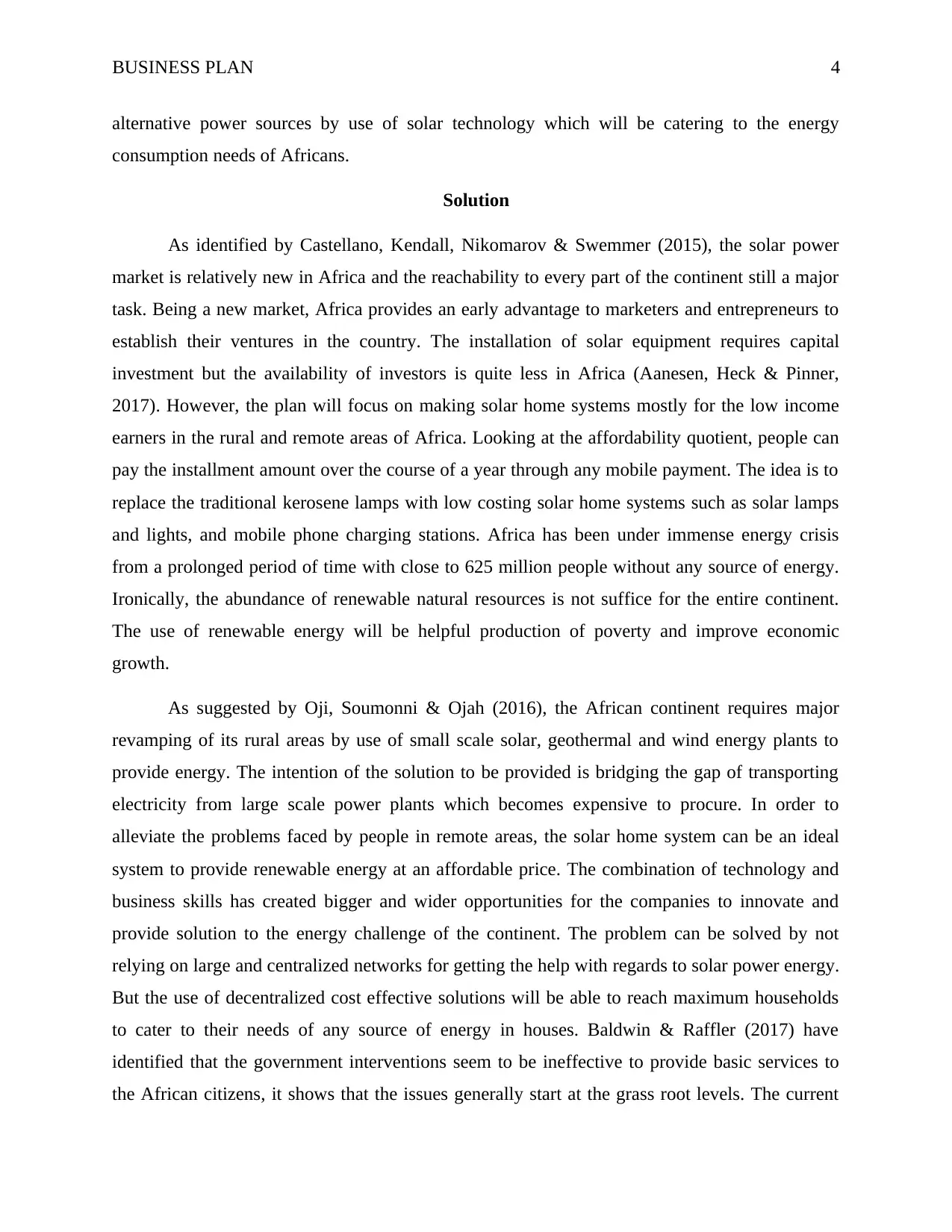
BUSINESS PLAN 4
alternative power sources by use of solar technology which will be catering to the energy
consumption needs of Africans.
Solution
As identified by Castellano, Kendall, Nikomarov & Swemmer (2015), the solar power
market is relatively new in Africa and the reachability to every part of the continent still a major
task. Being a new market, Africa provides an early advantage to marketers and entrepreneurs to
establish their ventures in the country. The installation of solar equipment requires capital
investment but the availability of investors is quite less in Africa (Aanesen, Heck & Pinner,
2017). However, the plan will focus on making solar home systems mostly for the low income
earners in the rural and remote areas of Africa. Looking at the affordability quotient, people can
pay the installment amount over the course of a year through any mobile payment. The idea is to
replace the traditional kerosene lamps with low costing solar home systems such as solar lamps
and lights, and mobile phone charging stations. Africa has been under immense energy crisis
from a prolonged period of time with close to 625 million people without any source of energy.
Ironically, the abundance of renewable natural resources is not suffice for the entire continent.
The use of renewable energy will be helpful production of poverty and improve economic
growth.
As suggested by Oji, Soumonni & Ojah (2016), the African continent requires major
revamping of its rural areas by use of small scale solar, geothermal and wind energy plants to
provide energy. The intention of the solution to be provided is bridging the gap of transporting
electricity from large scale power plants which becomes expensive to procure. In order to
alleviate the problems faced by people in remote areas, the solar home system can be an ideal
system to provide renewable energy at an affordable price. The combination of technology and
business skills has created bigger and wider opportunities for the companies to innovate and
provide solution to the energy challenge of the continent. The problem can be solved by not
relying on large and centralized networks for getting the help with regards to solar power energy.
But the use of decentralized cost effective solutions will be able to reach maximum households
to cater to their needs of any source of energy in houses. Baldwin & Raffler (2017) have
identified that the government interventions seem to be ineffective to provide basic services to
the African citizens, it shows that the issues generally start at the grass root levels. The current
alternative power sources by use of solar technology which will be catering to the energy
consumption needs of Africans.
Solution
As identified by Castellano, Kendall, Nikomarov & Swemmer (2015), the solar power
market is relatively new in Africa and the reachability to every part of the continent still a major
task. Being a new market, Africa provides an early advantage to marketers and entrepreneurs to
establish their ventures in the country. The installation of solar equipment requires capital
investment but the availability of investors is quite less in Africa (Aanesen, Heck & Pinner,
2017). However, the plan will focus on making solar home systems mostly for the low income
earners in the rural and remote areas of Africa. Looking at the affordability quotient, people can
pay the installment amount over the course of a year through any mobile payment. The idea is to
replace the traditional kerosene lamps with low costing solar home systems such as solar lamps
and lights, and mobile phone charging stations. Africa has been under immense energy crisis
from a prolonged period of time with close to 625 million people without any source of energy.
Ironically, the abundance of renewable natural resources is not suffice for the entire continent.
The use of renewable energy will be helpful production of poverty and improve economic
growth.
As suggested by Oji, Soumonni & Ojah (2016), the African continent requires major
revamping of its rural areas by use of small scale solar, geothermal and wind energy plants to
provide energy. The intention of the solution to be provided is bridging the gap of transporting
electricity from large scale power plants which becomes expensive to procure. In order to
alleviate the problems faced by people in remote areas, the solar home system can be an ideal
system to provide renewable energy at an affordable price. The combination of technology and
business skills has created bigger and wider opportunities for the companies to innovate and
provide solution to the energy challenge of the continent. The problem can be solved by not
relying on large and centralized networks for getting the help with regards to solar power energy.
But the use of decentralized cost effective solutions will be able to reach maximum households
to cater to their needs of any source of energy in houses. Baldwin & Raffler (2017) have
identified that the government interventions seem to be ineffective to provide basic services to
the African citizens, it shows that the issues generally start at the grass root levels. The current
Paraphrase This Document
Need a fresh take? Get an instant paraphrase of this document with our AI Paraphraser
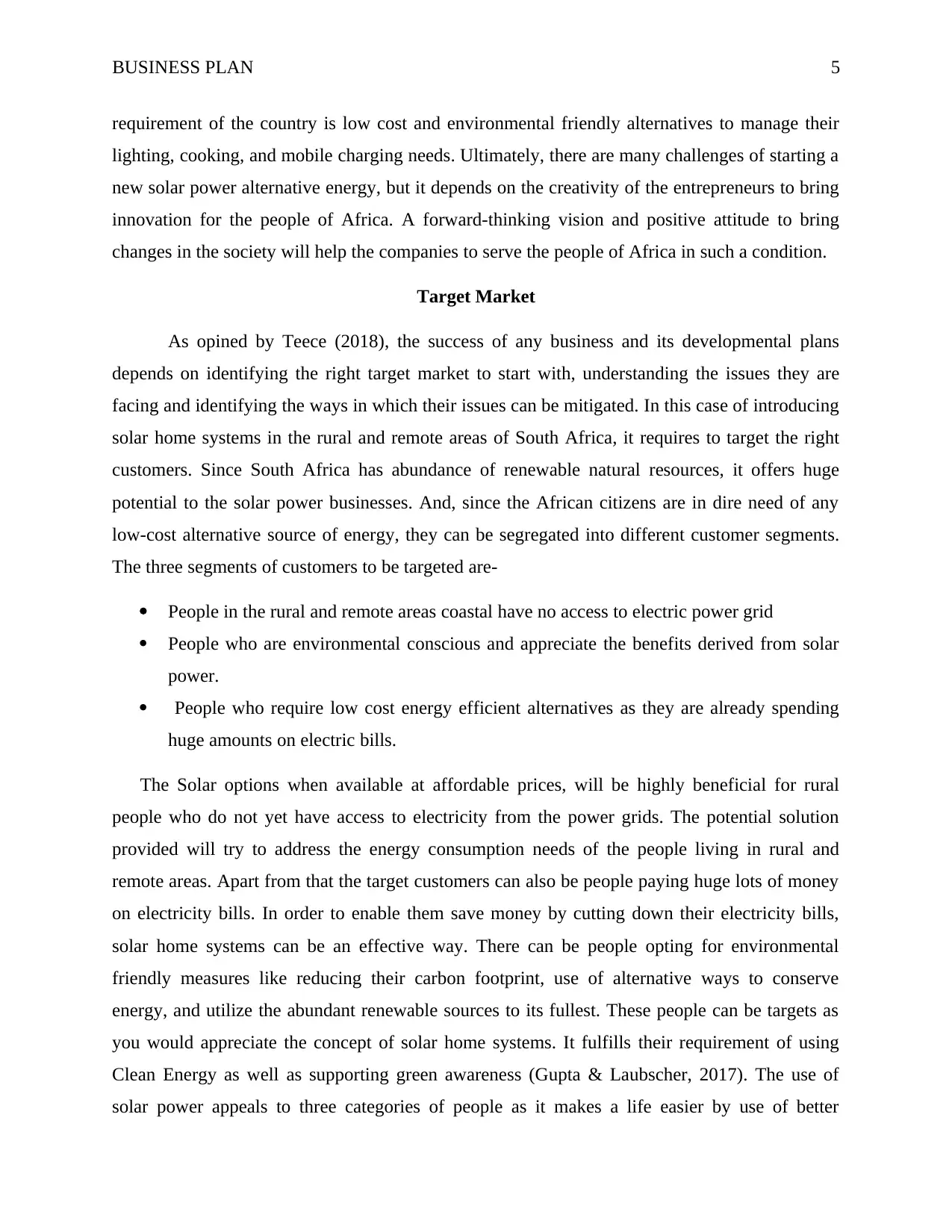
BUSINESS PLAN 5
requirement of the country is low cost and environmental friendly alternatives to manage their
lighting, cooking, and mobile charging needs. Ultimately, there are many challenges of starting a
new solar power alternative energy, but it depends on the creativity of the entrepreneurs to bring
innovation for the people of Africa. A forward-thinking vision and positive attitude to bring
changes in the society will help the companies to serve the people of Africa in such a condition.
Target Market
As opined by Teece (2018), the success of any business and its developmental plans
depends on identifying the right target market to start with, understanding the issues they are
facing and identifying the ways in which their issues can be mitigated. In this case of introducing
solar home systems in the rural and remote areas of South Africa, it requires to target the right
customers. Since South Africa has abundance of renewable natural resources, it offers huge
potential to the solar power businesses. And, since the African citizens are in dire need of any
low-cost alternative source of energy, they can be segregated into different customer segments.
The three segments of customers to be targeted are-
People in the rural and remote areas coastal have no access to electric power grid
People who are environmental conscious and appreciate the benefits derived from solar
power.
People who require low cost energy efficient alternatives as they are already spending
huge amounts on electric bills.
The Solar options when available at affordable prices, will be highly beneficial for rural
people who do not yet have access to electricity from the power grids. The potential solution
provided will try to address the energy consumption needs of the people living in rural and
remote areas. Apart from that the target customers can also be people paying huge lots of money
on electricity bills. In order to enable them save money by cutting down their electricity bills,
solar home systems can be an effective way. There can be people opting for environmental
friendly measures like reducing their carbon footprint, use of alternative ways to conserve
energy, and utilize the abundant renewable sources to its fullest. These people can be targets as
you would appreciate the concept of solar home systems. It fulfills their requirement of using
Clean Energy as well as supporting green awareness (Gupta & Laubscher, 2017). The use of
solar power appeals to three categories of people as it makes a life easier by use of better
requirement of the country is low cost and environmental friendly alternatives to manage their
lighting, cooking, and mobile charging needs. Ultimately, there are many challenges of starting a
new solar power alternative energy, but it depends on the creativity of the entrepreneurs to bring
innovation for the people of Africa. A forward-thinking vision and positive attitude to bring
changes in the society will help the companies to serve the people of Africa in such a condition.
Target Market
As opined by Teece (2018), the success of any business and its developmental plans
depends on identifying the right target market to start with, understanding the issues they are
facing and identifying the ways in which their issues can be mitigated. In this case of introducing
solar home systems in the rural and remote areas of South Africa, it requires to target the right
customers. Since South Africa has abundance of renewable natural resources, it offers huge
potential to the solar power businesses. And, since the African citizens are in dire need of any
low-cost alternative source of energy, they can be segregated into different customer segments.
The three segments of customers to be targeted are-
People in the rural and remote areas coastal have no access to electric power grid
People who are environmental conscious and appreciate the benefits derived from solar
power.
People who require low cost energy efficient alternatives as they are already spending
huge amounts on electric bills.
The Solar options when available at affordable prices, will be highly beneficial for rural
people who do not yet have access to electricity from the power grids. The potential solution
provided will try to address the energy consumption needs of the people living in rural and
remote areas. Apart from that the target customers can also be people paying huge lots of money
on electricity bills. In order to enable them save money by cutting down their electricity bills,
solar home systems can be an effective way. There can be people opting for environmental
friendly measures like reducing their carbon footprint, use of alternative ways to conserve
energy, and utilize the abundant renewable sources to its fullest. These people can be targets as
you would appreciate the concept of solar home systems. It fulfills their requirement of using
Clean Energy as well as supporting green awareness (Gupta & Laubscher, 2017). The use of
solar power appeals to three categories of people as it makes a life easier by use of better
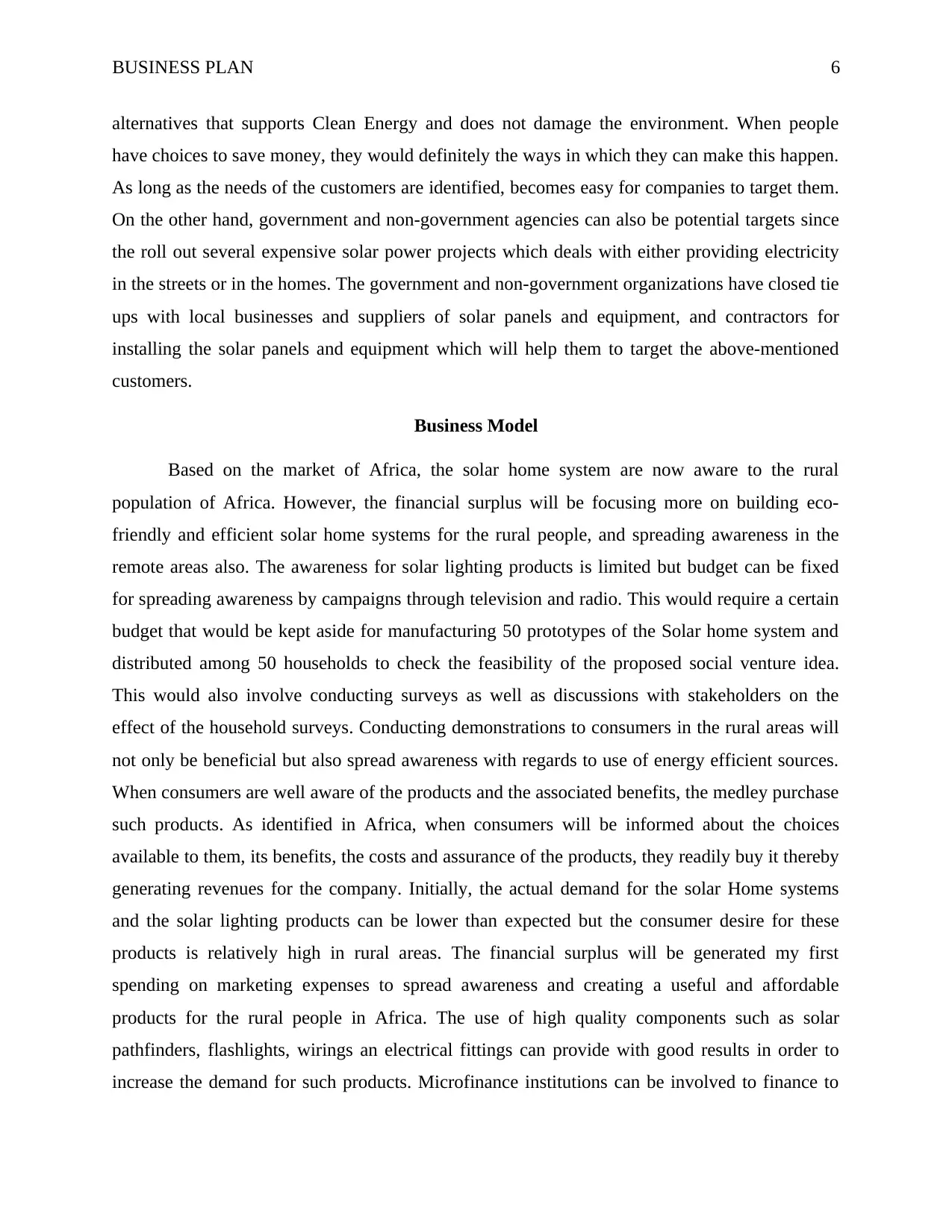
BUSINESS PLAN 6
alternatives that supports Clean Energy and does not damage the environment. When people
have choices to save money, they would definitely the ways in which they can make this happen.
As long as the needs of the customers are identified, becomes easy for companies to target them.
On the other hand, government and non-government agencies can also be potential targets since
the roll out several expensive solar power projects which deals with either providing electricity
in the streets or in the homes. The government and non-government organizations have closed tie
ups with local businesses and suppliers of solar panels and equipment, and contractors for
installing the solar panels and equipment which will help them to target the above-mentioned
customers.
Business Model
Based on the market of Africa, the solar home system are now aware to the rural
population of Africa. However, the financial surplus will be focusing more on building eco-
friendly and efficient solar home systems for the rural people, and spreading awareness in the
remote areas also. The awareness for solar lighting products is limited but budget can be fixed
for spreading awareness by campaigns through television and radio. This would require a certain
budget that would be kept aside for manufacturing 50 prototypes of the Solar home system and
distributed among 50 households to check the feasibility of the proposed social venture idea.
This would also involve conducting surveys as well as discussions with stakeholders on the
effect of the household surveys. Conducting demonstrations to consumers in the rural areas will
not only be beneficial but also spread awareness with regards to use of energy efficient sources.
When consumers are well aware of the products and the associated benefits, the medley purchase
such products. As identified in Africa, when consumers will be informed about the choices
available to them, its benefits, the costs and assurance of the products, they readily buy it thereby
generating revenues for the company. Initially, the actual demand for the solar Home systems
and the solar lighting products can be lower than expected but the consumer desire for these
products is relatively high in rural areas. The financial surplus will be generated my first
spending on marketing expenses to spread awareness and creating a useful and affordable
products for the rural people in Africa. The use of high quality components such as solar
pathfinders, flashlights, wirings an electrical fittings can provide with good results in order to
increase the demand for such products. Microfinance institutions can be involved to finance to
alternatives that supports Clean Energy and does not damage the environment. When people
have choices to save money, they would definitely the ways in which they can make this happen.
As long as the needs of the customers are identified, becomes easy for companies to target them.
On the other hand, government and non-government agencies can also be potential targets since
the roll out several expensive solar power projects which deals with either providing electricity
in the streets or in the homes. The government and non-government organizations have closed tie
ups with local businesses and suppliers of solar panels and equipment, and contractors for
installing the solar panels and equipment which will help them to target the above-mentioned
customers.
Business Model
Based on the market of Africa, the solar home system are now aware to the rural
population of Africa. However, the financial surplus will be focusing more on building eco-
friendly and efficient solar home systems for the rural people, and spreading awareness in the
remote areas also. The awareness for solar lighting products is limited but budget can be fixed
for spreading awareness by campaigns through television and radio. This would require a certain
budget that would be kept aside for manufacturing 50 prototypes of the Solar home system and
distributed among 50 households to check the feasibility of the proposed social venture idea.
This would also involve conducting surveys as well as discussions with stakeholders on the
effect of the household surveys. Conducting demonstrations to consumers in the rural areas will
not only be beneficial but also spread awareness with regards to use of energy efficient sources.
When consumers are well aware of the products and the associated benefits, the medley purchase
such products. As identified in Africa, when consumers will be informed about the choices
available to them, its benefits, the costs and assurance of the products, they readily buy it thereby
generating revenues for the company. Initially, the actual demand for the solar Home systems
and the solar lighting products can be lower than expected but the consumer desire for these
products is relatively high in rural areas. The financial surplus will be generated my first
spending on marketing expenses to spread awareness and creating a useful and affordable
products for the rural people in Africa. The use of high quality components such as solar
pathfinders, flashlights, wirings an electrical fittings can provide with good results in order to
increase the demand for such products. Microfinance institutions can be involved to finance to
⊘ This is a preview!⊘
Do you want full access?
Subscribe today to unlock all pages.

Trusted by 1+ million students worldwide
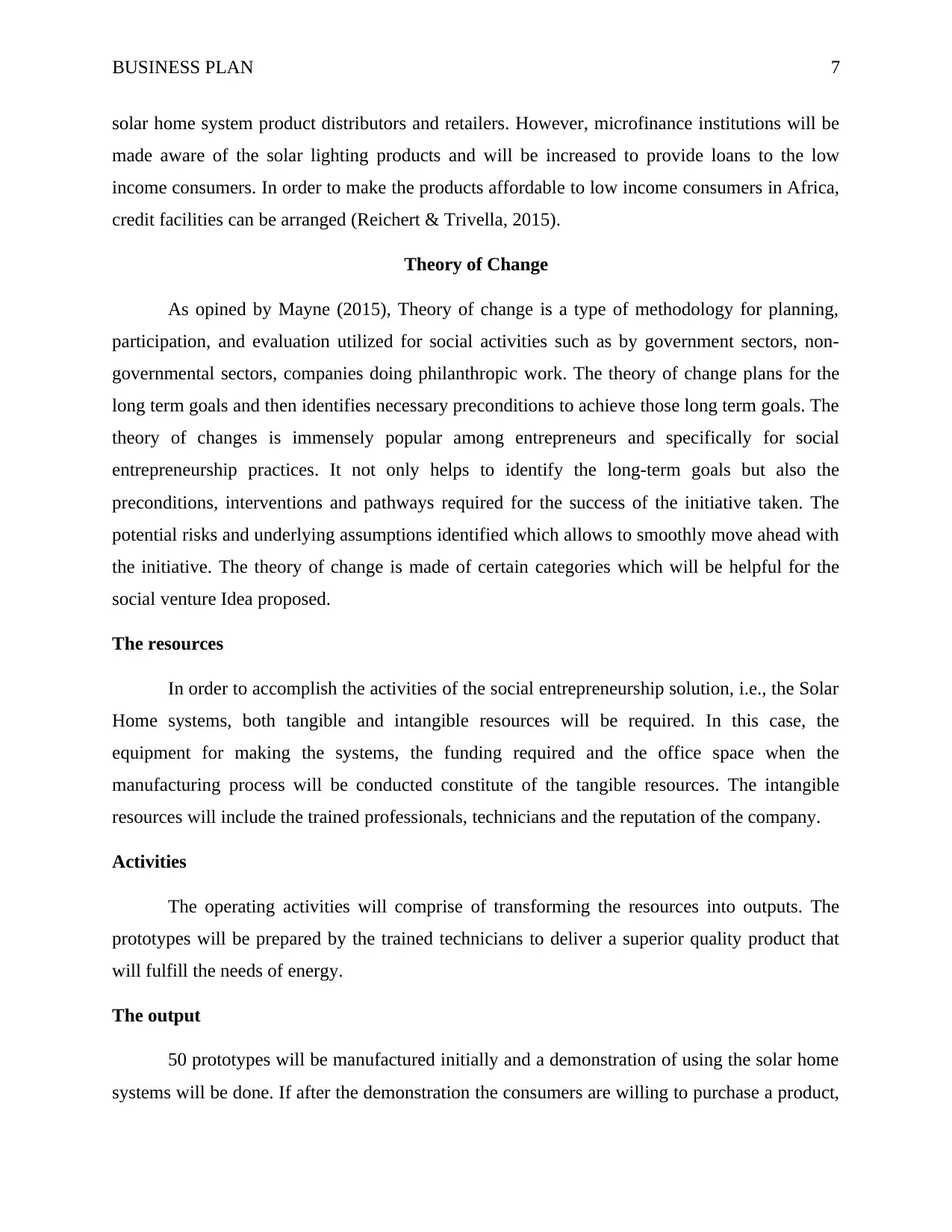
BUSINESS PLAN 7
solar home system product distributors and retailers. However, microfinance institutions will be
made aware of the solar lighting products and will be increased to provide loans to the low
income consumers. In order to make the products affordable to low income consumers in Africa,
credit facilities can be arranged (Reichert & Trivella, 2015).
Theory of Change
As opined by Mayne (2015), Theory of change is a type of methodology for planning,
participation, and evaluation utilized for social activities such as by government sectors, non-
governmental sectors, companies doing philanthropic work. The theory of change plans for the
long term goals and then identifies necessary preconditions to achieve those long term goals. The
theory of changes is immensely popular among entrepreneurs and specifically for social
entrepreneurship practices. It not only helps to identify the long-term goals but also the
preconditions, interventions and pathways required for the success of the initiative taken. The
potential risks and underlying assumptions identified which allows to smoothly move ahead with
the initiative. The theory of change is made of certain categories which will be helpful for the
social venture Idea proposed.
The resources
In order to accomplish the activities of the social entrepreneurship solution, i.e., the Solar
Home systems, both tangible and intangible resources will be required. In this case, the
equipment for making the systems, the funding required and the office space when the
manufacturing process will be conducted constitute of the tangible resources. The intangible
resources will include the trained professionals, technicians and the reputation of the company.
Activities
The operating activities will comprise of transforming the resources into outputs. The
prototypes will be prepared by the trained technicians to deliver a superior quality product that
will fulfill the needs of energy.
The output
50 prototypes will be manufactured initially and a demonstration of using the solar home
systems will be done. If after the demonstration the consumers are willing to purchase a product,
solar home system product distributors and retailers. However, microfinance institutions will be
made aware of the solar lighting products and will be increased to provide loans to the low
income consumers. In order to make the products affordable to low income consumers in Africa,
credit facilities can be arranged (Reichert & Trivella, 2015).
Theory of Change
As opined by Mayne (2015), Theory of change is a type of methodology for planning,
participation, and evaluation utilized for social activities such as by government sectors, non-
governmental sectors, companies doing philanthropic work. The theory of change plans for the
long term goals and then identifies necessary preconditions to achieve those long term goals. The
theory of changes is immensely popular among entrepreneurs and specifically for social
entrepreneurship practices. It not only helps to identify the long-term goals but also the
preconditions, interventions and pathways required for the success of the initiative taken. The
potential risks and underlying assumptions identified which allows to smoothly move ahead with
the initiative. The theory of change is made of certain categories which will be helpful for the
social venture Idea proposed.
The resources
In order to accomplish the activities of the social entrepreneurship solution, i.e., the Solar
Home systems, both tangible and intangible resources will be required. In this case, the
equipment for making the systems, the funding required and the office space when the
manufacturing process will be conducted constitute of the tangible resources. The intangible
resources will include the trained professionals, technicians and the reputation of the company.
Activities
The operating activities will comprise of transforming the resources into outputs. The
prototypes will be prepared by the trained technicians to deliver a superior quality product that
will fulfill the needs of energy.
The output
50 prototypes will be manufactured initially and a demonstration of using the solar home
systems will be done. If after the demonstration the consumers are willing to purchase a product,
Paraphrase This Document
Need a fresh take? Get an instant paraphrase of this document with our AI Paraphraser
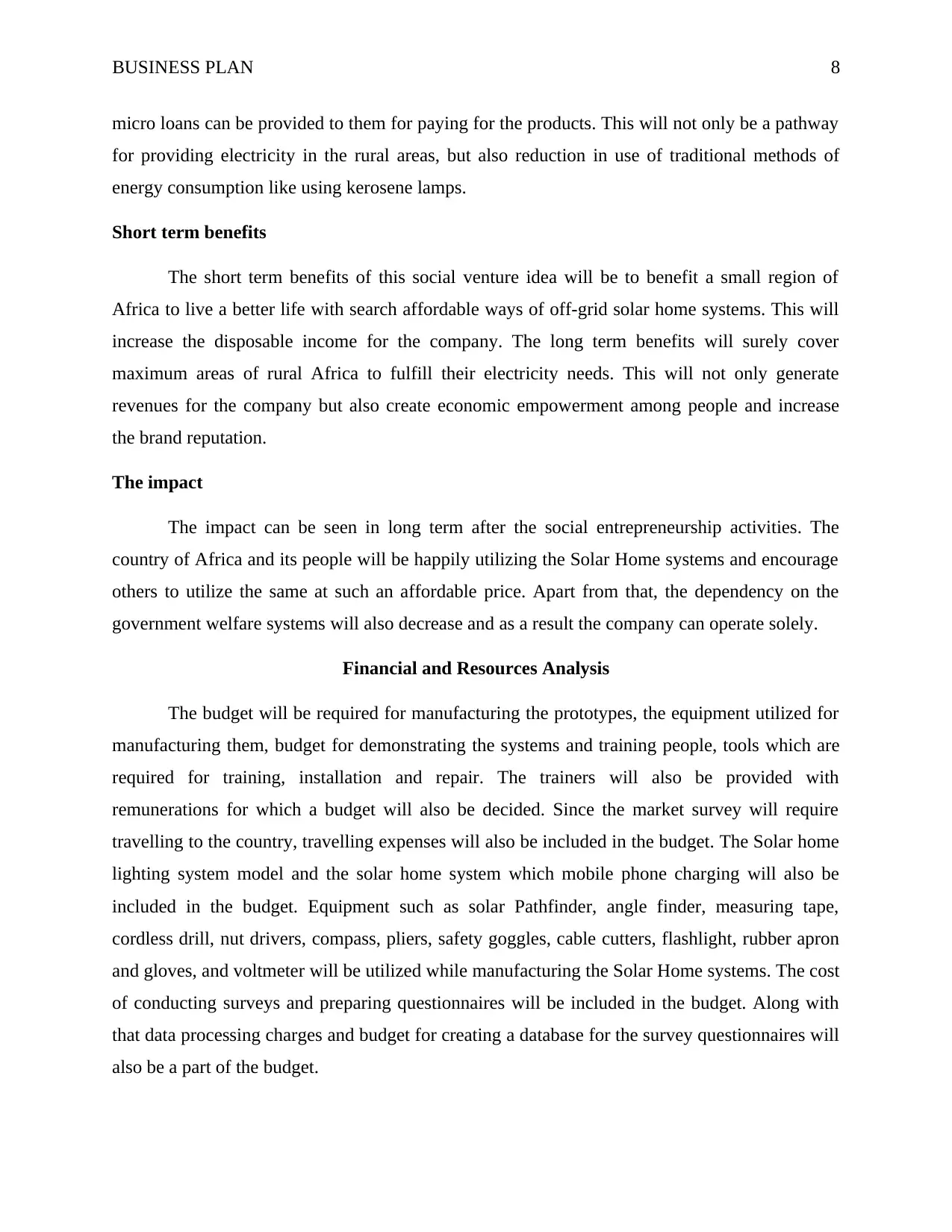
BUSINESS PLAN 8
micro loans can be provided to them for paying for the products. This will not only be a pathway
for providing electricity in the rural areas, but also reduction in use of traditional methods of
energy consumption like using kerosene lamps.
Short term benefits
The short term benefits of this social venture idea will be to benefit a small region of
Africa to live a better life with search affordable ways of off-grid solar home systems. This will
increase the disposable income for the company. The long term benefits will surely cover
maximum areas of rural Africa to fulfill their electricity needs. This will not only generate
revenues for the company but also create economic empowerment among people and increase
the brand reputation.
The impact
The impact can be seen in long term after the social entrepreneurship activities. The
country of Africa and its people will be happily utilizing the Solar Home systems and encourage
others to utilize the same at such an affordable price. Apart from that, the dependency on the
government welfare systems will also decrease and as a result the company can operate solely.
Financial and Resources Analysis
The budget will be required for manufacturing the prototypes, the equipment utilized for
manufacturing them, budget for demonstrating the systems and training people, tools which are
required for training, installation and repair. The trainers will also be provided with
remunerations for which a budget will also be decided. Since the market survey will require
travelling to the country, travelling expenses will also be included in the budget. The Solar home
lighting system model and the solar home system which mobile phone charging will also be
included in the budget. Equipment such as solar Pathfinder, angle finder, measuring tape,
cordless drill, nut drivers, compass, pliers, safety goggles, cable cutters, flashlight, rubber apron
and gloves, and voltmeter will be utilized while manufacturing the Solar Home systems. The cost
of conducting surveys and preparing questionnaires will be included in the budget. Along with
that data processing charges and budget for creating a database for the survey questionnaires will
also be a part of the budget.
micro loans can be provided to them for paying for the products. This will not only be a pathway
for providing electricity in the rural areas, but also reduction in use of traditional methods of
energy consumption like using kerosene lamps.
Short term benefits
The short term benefits of this social venture idea will be to benefit a small region of
Africa to live a better life with search affordable ways of off-grid solar home systems. This will
increase the disposable income for the company. The long term benefits will surely cover
maximum areas of rural Africa to fulfill their electricity needs. This will not only generate
revenues for the company but also create economic empowerment among people and increase
the brand reputation.
The impact
The impact can be seen in long term after the social entrepreneurship activities. The
country of Africa and its people will be happily utilizing the Solar Home systems and encourage
others to utilize the same at such an affordable price. Apart from that, the dependency on the
government welfare systems will also decrease and as a result the company can operate solely.
Financial and Resources Analysis
The budget will be required for manufacturing the prototypes, the equipment utilized for
manufacturing them, budget for demonstrating the systems and training people, tools which are
required for training, installation and repair. The trainers will also be provided with
remunerations for which a budget will also be decided. Since the market survey will require
travelling to the country, travelling expenses will also be included in the budget. The Solar home
lighting system model and the solar home system which mobile phone charging will also be
included in the budget. Equipment such as solar Pathfinder, angle finder, measuring tape,
cordless drill, nut drivers, compass, pliers, safety goggles, cable cutters, flashlight, rubber apron
and gloves, and voltmeter will be utilized while manufacturing the Solar Home systems. The cost
of conducting surveys and preparing questionnaires will be included in the budget. Along with
that data processing charges and budget for creating a database for the survey questionnaires will
also be a part of the budget.
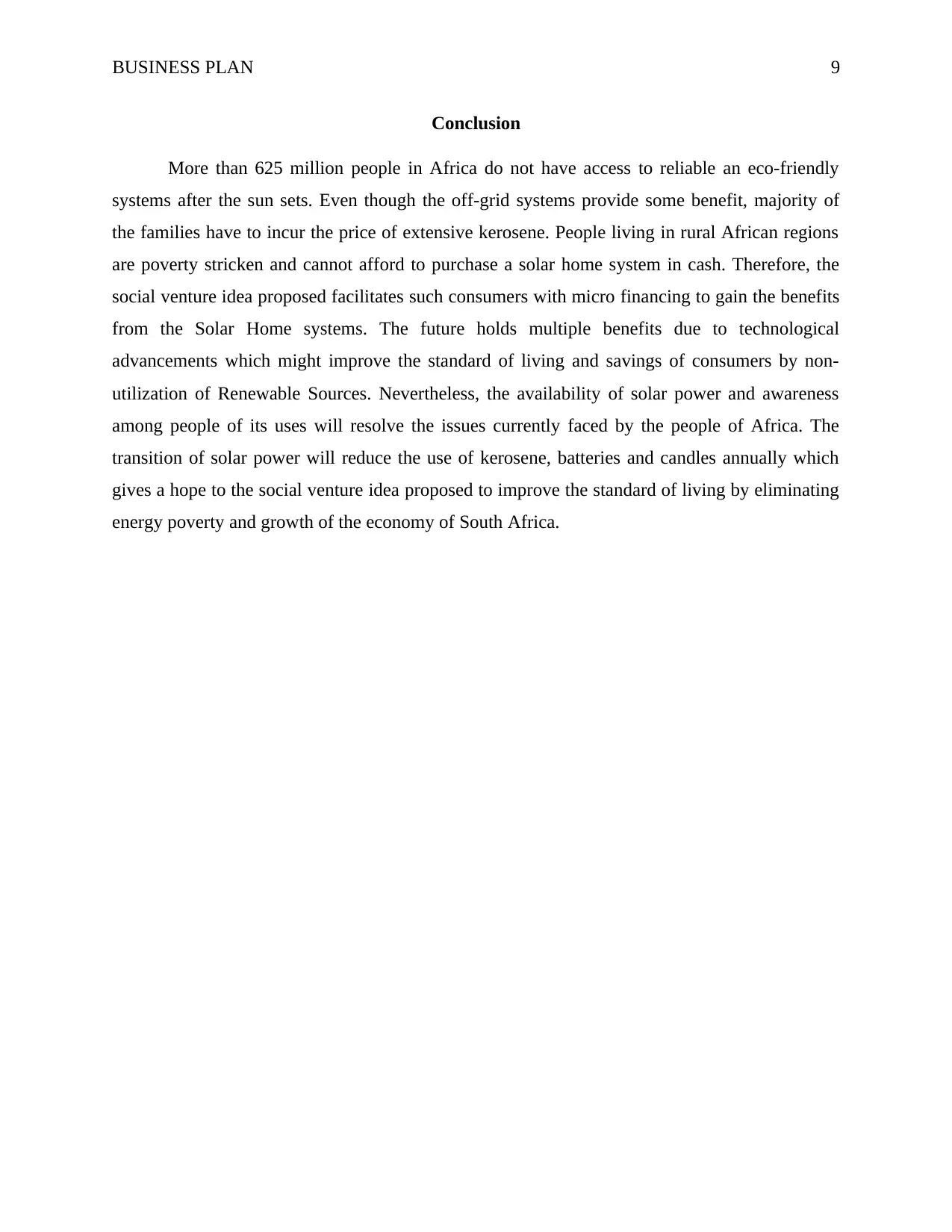
BUSINESS PLAN 9
Conclusion
More than 625 million people in Africa do not have access to reliable an eco-friendly
systems after the sun sets. Even though the off-grid systems provide some benefit, majority of
the families have to incur the price of extensive kerosene. People living in rural African regions
are poverty stricken and cannot afford to purchase a solar home system in cash. Therefore, the
social venture idea proposed facilitates such consumers with micro financing to gain the benefits
from the Solar Home systems. The future holds multiple benefits due to technological
advancements which might improve the standard of living and savings of consumers by non-
utilization of Renewable Sources. Nevertheless, the availability of solar power and awareness
among people of its uses will resolve the issues currently faced by the people of Africa. The
transition of solar power will reduce the use of kerosene, batteries and candles annually which
gives a hope to the social venture idea proposed to improve the standard of living by eliminating
energy poverty and growth of the economy of South Africa.
Conclusion
More than 625 million people in Africa do not have access to reliable an eco-friendly
systems after the sun sets. Even though the off-grid systems provide some benefit, majority of
the families have to incur the price of extensive kerosene. People living in rural African regions
are poverty stricken and cannot afford to purchase a solar home system in cash. Therefore, the
social venture idea proposed facilitates such consumers with micro financing to gain the benefits
from the Solar Home systems. The future holds multiple benefits due to technological
advancements which might improve the standard of living and savings of consumers by non-
utilization of Renewable Sources. Nevertheless, the availability of solar power and awareness
among people of its uses will resolve the issues currently faced by the people of Africa. The
transition of solar power will reduce the use of kerosene, batteries and candles annually which
gives a hope to the social venture idea proposed to improve the standard of living by eliminating
energy poverty and growth of the economy of South Africa.
⊘ This is a preview!⊘
Do you want full access?
Subscribe today to unlock all pages.

Trusted by 1+ million students worldwide
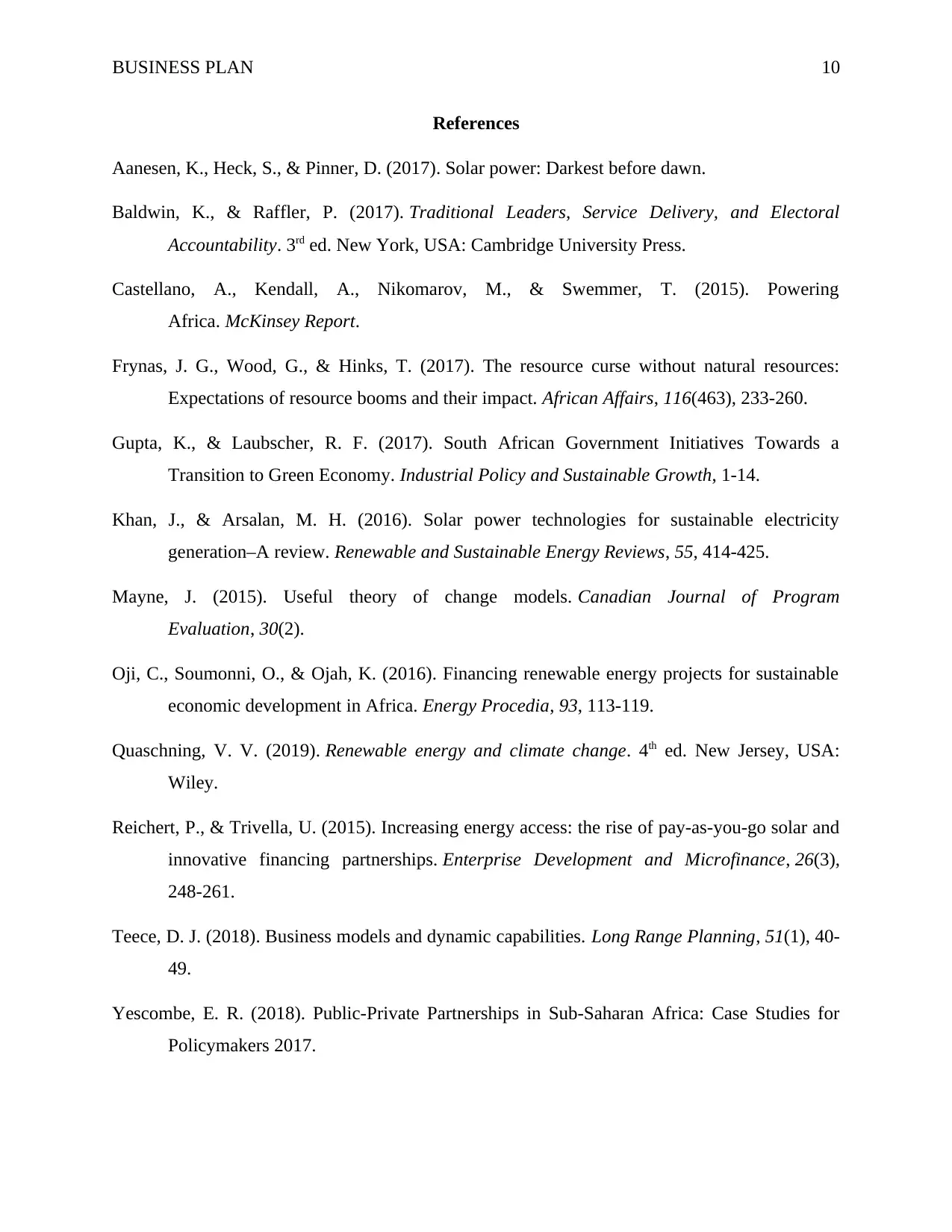
BUSINESS PLAN 10
References
Aanesen, K., Heck, S., & Pinner, D. (2017). Solar power: Darkest before dawn.
Baldwin, K., & Raffler, P. (2017). Traditional Leaders, Service Delivery, and Electoral
Accountability. 3rd ed. New York, USA: Cambridge University Press.
Castellano, A., Kendall, A., Nikomarov, M., & Swemmer, T. (2015). Powering
Africa. McKinsey Report.
Frynas, J. G., Wood, G., & Hinks, T. (2017). The resource curse without natural resources:
Expectations of resource booms and their impact. African Affairs, 116(463), 233-260.
Gupta, K., & Laubscher, R. F. (2017). South African Government Initiatives Towards a
Transition to Green Economy. Industrial Policy and Sustainable Growth, 1-14.
Khan, J., & Arsalan, M. H. (2016). Solar power technologies for sustainable electricity
generation–A review. Renewable and Sustainable Energy Reviews, 55, 414-425.
Mayne, J. (2015). Useful theory of change models. Canadian Journal of Program
Evaluation, 30(2).
Oji, C., Soumonni, O., & Ojah, K. (2016). Financing renewable energy projects for sustainable
economic development in Africa. Energy Procedia, 93, 113-119.
Quaschning, V. V. (2019). Renewable energy and climate change. 4th ed. New Jersey, USA:
Wiley.
Reichert, P., & Trivella, U. (2015). Increasing energy access: the rise of pay-as-you-go solar and
innovative financing partnerships. Enterprise Development and Microfinance, 26(3),
248-261.
Teece, D. J. (2018). Business models and dynamic capabilities. Long Range Planning, 51(1), 40-
49.
Yescombe, E. R. (2018). Public-Private Partnerships in Sub-Saharan Africa: Case Studies for
Policymakers 2017.
References
Aanesen, K., Heck, S., & Pinner, D. (2017). Solar power: Darkest before dawn.
Baldwin, K., & Raffler, P. (2017). Traditional Leaders, Service Delivery, and Electoral
Accountability. 3rd ed. New York, USA: Cambridge University Press.
Castellano, A., Kendall, A., Nikomarov, M., & Swemmer, T. (2015). Powering
Africa. McKinsey Report.
Frynas, J. G., Wood, G., & Hinks, T. (2017). The resource curse without natural resources:
Expectations of resource booms and their impact. African Affairs, 116(463), 233-260.
Gupta, K., & Laubscher, R. F. (2017). South African Government Initiatives Towards a
Transition to Green Economy. Industrial Policy and Sustainable Growth, 1-14.
Khan, J., & Arsalan, M. H. (2016). Solar power technologies for sustainable electricity
generation–A review. Renewable and Sustainable Energy Reviews, 55, 414-425.
Mayne, J. (2015). Useful theory of change models. Canadian Journal of Program
Evaluation, 30(2).
Oji, C., Soumonni, O., & Ojah, K. (2016). Financing renewable energy projects for sustainable
economic development in Africa. Energy Procedia, 93, 113-119.
Quaschning, V. V. (2019). Renewable energy and climate change. 4th ed. New Jersey, USA:
Wiley.
Reichert, P., & Trivella, U. (2015). Increasing energy access: the rise of pay-as-you-go solar and
innovative financing partnerships. Enterprise Development and Microfinance, 26(3),
248-261.
Teece, D. J. (2018). Business models and dynamic capabilities. Long Range Planning, 51(1), 40-
49.
Yescombe, E. R. (2018). Public-Private Partnerships in Sub-Saharan Africa: Case Studies for
Policymakers 2017.
Paraphrase This Document
Need a fresh take? Get an instant paraphrase of this document with our AI Paraphraser
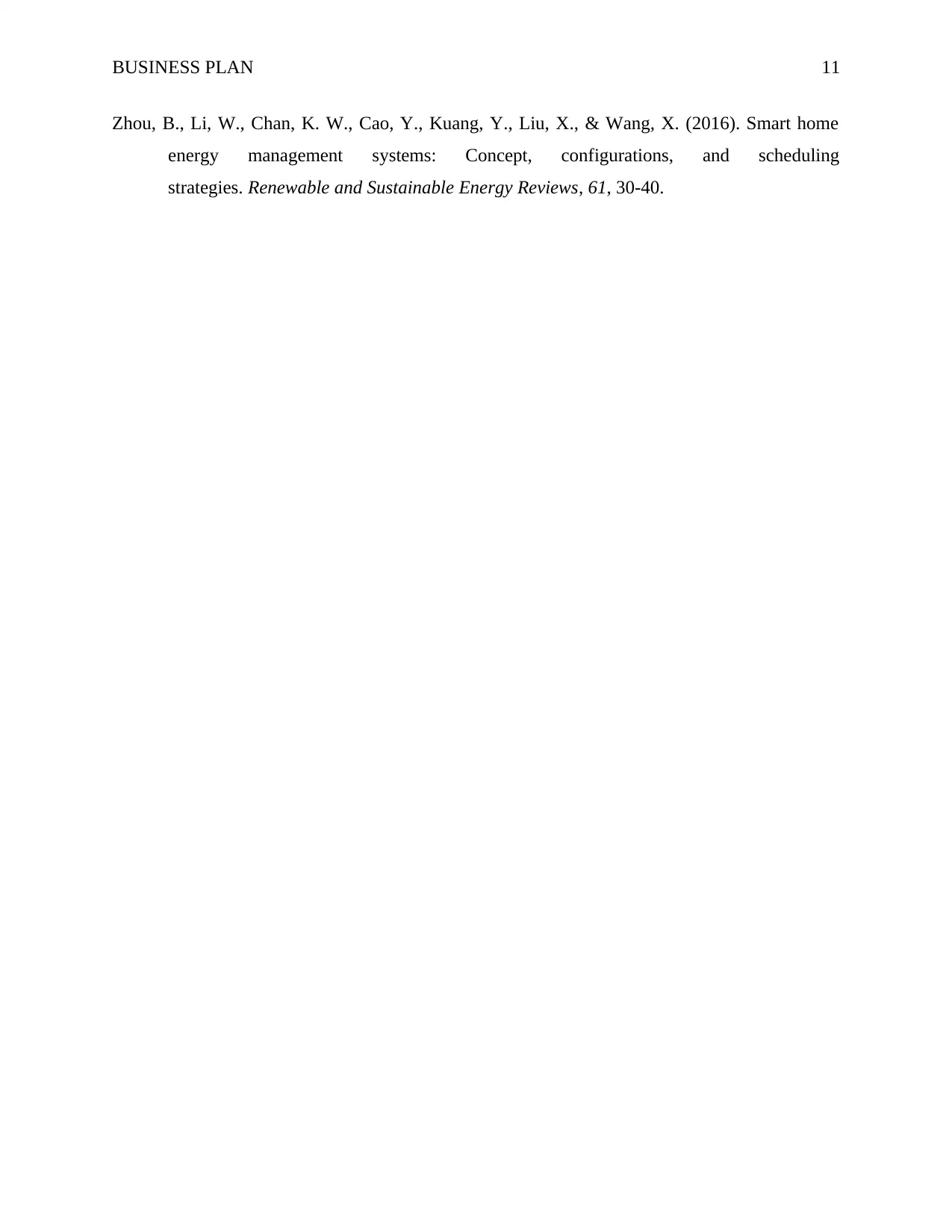
BUSINESS PLAN 11
Zhou, B., Li, W., Chan, K. W., Cao, Y., Kuang, Y., Liu, X., & Wang, X. (2016). Smart home
energy management systems: Concept, configurations, and scheduling
strategies. Renewable and Sustainable Energy Reviews, 61, 30-40.
Zhou, B., Li, W., Chan, K. W., Cao, Y., Kuang, Y., Liu, X., & Wang, X. (2016). Smart home
energy management systems: Concept, configurations, and scheduling
strategies. Renewable and Sustainable Energy Reviews, 61, 30-40.

BUSINESS PLAN 12
⊘ This is a preview!⊘
Do you want full access?
Subscribe today to unlock all pages.

Trusted by 1+ million students worldwide
1 out of 12
Related Documents
Your All-in-One AI-Powered Toolkit for Academic Success.
+13062052269
info@desklib.com
Available 24*7 on WhatsApp / Email
![[object Object]](/_next/static/media/star-bottom.7253800d.svg)
Unlock your academic potential
Copyright © 2020–2026 A2Z Services. All Rights Reserved. Developed and managed by ZUCOL.




